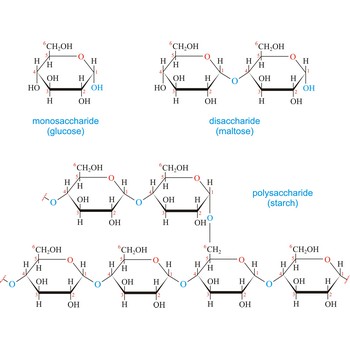fluid mechanics → mehanika fluida
Fluid mechanics is the study of various properties of the fluid (liquids and gases): velocity, pressure, density and temperature, as functions of space and time.
carbohydrate → ugljikohidrat
Carbohydrates (often called carbs for short) are polyhydroxy aldehydes or ketones, or substances that yield such compounds on hydrolysis. They are also known as saccharides, a term derived from the Latin word saccharum for sugar. Carbohydrates are the most abundant class of compounds in the biological world, making up more than 50 % of the dry weight of the Earth’s biomass. Every type of food we eat can have its energy traced back to a plant. Plants use carbon dioxide and water to make glucose, a simple sugar, in photosynthesis. Other carbohydrates such as cellulose and starch are made from the glucose. Light from the sun is absorbed by chlorophyll and this is converted to the energy necessary to biosynthesize carbohydrates
The term carbohydrate was applied originally to monosaccharides, in recognition of the fact that their empirical composition can be expressed as Cx(H2O)y. Later structural studies revealed that these compounds were not hydrates but the term carbohydrate persists.
Carbohydrates are generally classed as either simple or complex. Simple sugars, or monosaccharides, are carbohydrates that can’t be converted into smaller subunits by hydrolysis. Complex carbohydrates are made of two (disaccharides) or more (oligosaccharides, polysaccharides) simple sugars linked together by acetal (glycosidic) bonds and can be split into the former by hydrolysis.
geochemistry → geokemija
Geochemistry is the scientific study of the chemical composition of the Earth. It includes the study of the abundance of the Earth’s elements and their isotopes and the distribution of the elements in environments of the Earth (lithosphere, atmosphere, biosphere, and hydrosphere).
magnetochemistry → magnetokemija
Magnetochemistry is a branch of physical chemistry which studies relations between magnetism and the chemical structure of matter.
metallurgy → metalurgija
Metallurgy is a science which studies metals and their extraction from ore.
mineralogy → mineralogija
Mineralogy is a branch of geology that studies minerals: their structure and properties and the ways of distinguishing them.
thermochemistry → termokemija
Termochemistry is the study of heat absorbed or released during chemical changes.
thermodynamics → termodinamika
Thermodynamics is the scientific study of the interconversion of heat and other forms of energy.
toxicology → toksikologija
Toxicology is a science which studies all kinds of poisons and their effects on live organisms.
Citing this page:
Generalic, Eni. "Voltin stup." Croatian-English Chemistry Dictionary & Glossary. 29 June 2022. KTF-Split. {Date of access}. <https://glossary.periodni.com>.
Glossary
Periodic Table

